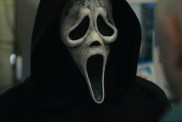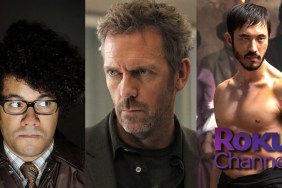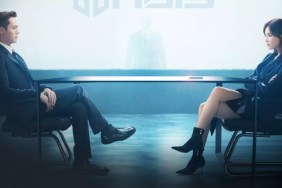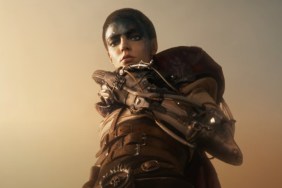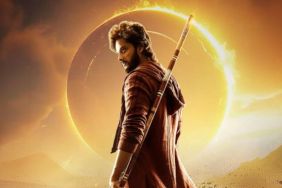In Syriana, actor Matt Damon played an energy analyst who forms a bond with the Emir of the United Arab Emirates after a tragic accident, in The Informant!, he was the accountant for a corporation who turns whistle blower, and in Invictus, he is a rugby player who helped Nelson Mandela pull South Africa back together after the end of Apartheid.
All three of those movies dealt with issues in the real world that could easily have been taken from the headlines, but in fact were telling stories that few moviegoers were aware of. In Green Zone, Damon reunites with director Paul Greengrass (The Bourne Ultimatum) to tackle the Iraq War and the little-known story of the soldiers assigned to find the Weapons of Mass Destruction (WMDs) who started questioning the Intel being provided to them by their superiors, eventually leading to the revelation that the military and the American people were being lied to. This story is told in a similar style as the “Bourne” movies, using handheld cameras to create realism but also including some of the same fast-paced action fans of those movies expect.
ComingSoon.net attended the New York junket for the movie a few weeks back. While normally an actor on the level Matt Damon would have an enormous press conference with hundreds of journalists from all over the country trying to get questions in, a massive snowstorm changed those plans, and we were lucky enough to get Damon for nearly thirty minutes with a relatively small group of journalists.
Question: How relevant is this story to 2010?
Matt Damon: (It) probably depends on your perspective. I think it’s extremely relevant. I mean, I think the last thing I’m saying (in the movie) to the Greg Kinnear character is about (how) the reasons we go to war matter. I think that’s extremely relevant – and not a partisan thing, either. That’s a sentiment, I think, that most people share. No matter what you believe, that really matters. I think the central question of the movie was something that I think we all asked. Our idea was to have a character who was a good soldier, who went there thinking he was going to find something and then got there and didn’t find it, and then asked the question “Why?” Which I think is kind of what happened for all of us. We were told something was going to happen and it didn’t, and then we went, “Oh, how did we get here? Oh, right, the weapons.” “Well, what happened with that? Where were they?” I think those are fundamental questions.
Q: What percentage of what we see in the movie is based on truth and was there a specific sequences of events that are particularly truthful?
Damon: Well, there were no weapons in Iraq, so that’s true. A lot of people went there thinking that there were. That’s true, too. Nobody has really explained what the f*ck happened. That’s true, too. But those are the central questions I think. I mean, what we have in the movie is, yeah, we have a guy playing a kind of neo-con type who actually invented a source, so that’s not based on anything. That’s obviously something for the movie. For the architecture of a thriller to work, it needs to boil down to a couple of characters who are standing in. So that stuff is obviously the movie, but the central questions of WMDs, that’s obviously true. My character is actually based on somebody. We had these things called Mobile Exploitation Teams, so in the movie I’m MED Team Delta. Monty [Gonzalez] actually led MED Team Alpha and he told me that he helped put the teams together and said that he was racing the other team leaders for who was going to be first on CNN holding up the weapons. In our movie that first really exciting kind of sequence, when I come out of that and say, “Where did this intel come from? Is this United Nations? This is the fourth time” and I make some comment like, “So it’s clear that this has happened to us before.” Monty in fact told me that the first site that he went to, he went ripping in there with everything in his intel packet. I think it was a porcelain factory but it was listed as a dual-use facility. Well, it’s a porcelain factory but then that’s really a cover because what they’re really making is some bad weapons there. He went in there and he looked around and he said, “This is all bullsh*t.” He said from the first site he went into he knew that there was something horribly wrong because, he said there’s no way a rational person could come in here and say that they’re making something here other than porcelain because that’s all that place could do. Here’s a guy who is on the pointy end of the spear there, hunting for the weapons and that experience was the one that they were having. They would go to the J-Mac and say, “Where did this intel generate from? Is this the same source we’re using because we haven’t found sh*t and these things keep telling us there’s going to be something in this factory and there’s nothing in these places? What’s going on?”
Q: Do you think there’s any risk of someone who’s less informed watching this movie and drawing conclusions based on the stuff you added for storytelling, not realizing that it’s meant as an action-thriller rather than a retelling of true events?
Damon: Right, it’s entertainment but kind of based in the real world and what we were trying to do is to take the “Bourne” world which is obviously a kind of heightened thing and Bourne is kind of a superhero character. We wanted to see if we could kind of take that extra step into the real world using the “Bourne” aesthetic. When we read Rajiv’s [Chandrasekaran] book, which his great “Imperial Life in the Emerald City” that provided the perfect backdrop, that kind of surreal Green Zone where all this conspiracy, paranoia and intrigue; that’s where everybody went, this shining city on the hill, but it was a kind of a surreal place where they had Pizza Hut, and they were disconnected from what was really going on. If you start with the question of the weapons, which was the reason ostensibly that we went there, you start with a guy who’s genuinely a good soldier and believes the weapons are there and you see him not find them and the next logical question he asks is, “Okay, but then what’s going on? Why aren’t they here?” Then that search kind of brings him into this world of the Green Zone. He’s suddenly there and he’s got very simple motives. He’s there to win a war, to save lives. He’s got very noble motives and suddenly finds himself in a very complicated world with these very powerful competing agendas and he’s in the middle of it. That is kind of classic thriller architecture and that’s what we set out to do, see if we could make a big action-thriller that kind of spoke to the world that we live in.

Q: What was it like working with the real soldiers as opposed to actors playing soldiers?
Damon: It was great. I mean, the amount of work that it would’ve taken to do what these guys just did naturally; for me, if you ever go on a movie set we have what’s always called a Technical Advisor. You can always tell who that person is because there are actors crowded around them henpecking them with questions. Usually it’s the expert. If you’re making a movie about the state police it’s the guy who was a state policeman, etc. But with this it was like having thirty of those guys and scenes like hitting Said’s house, where we go running in and break up that meeting, Monty even said to me that day, he said, “You’re about to see what these guys do. This is what they’re really good at.” Monty actually just stood in for me and they just hit the house the way that they would hit it and then they did it slowly and then we went, “Okay, first guy right. Second guy left. Third guy long.” Paul said, “Okay, I want you looking for the backdoor so you’re going to long and you’ll be the third guy through.” So we just kicked the door in and literally, right when I run by Clemens, he just peeled in behind me and we went in. I just loved that stuff because I call it NAR… “no acting required.” You’re just so taken over by the situation and surrounded by these guys who really just know what they’re doing. So it makes it feel really authentic.
Q: You reference Monty a couple of times. What kind of a resource was he?
Damon: He was great. All of that stuff, from the specific details to how he tied his shoes, literally, to specific operations and specific things that they did and how certain things worked and what you’d say here in this particular situation, if you were in this. Obviously, it’s based on Monty but this isn’t what happened to Monty. We go off into a whole different thing. It’s an action-thriller but we would setup these situations and his answers always shocked me a little bit. It was always really, really interesting. We had a scene that didn’t make it into the final film where I took the bodybag to the house of the guy and took it back to his wife. The way that the Hollywood people would conceive of that is like a big weepy scene of like, “Aren’t I horrible, your husband died and I couldn’t stop it.” I asked Monty, “What would you say to her?” and he said, “Basically, you’re doing a favor for her by bringing the body back so she can bury it within twenty-four hours and she has to make a decision right now whether or not she’s going to give you the information you need and you can get her to Jordan.” The point is that you’re in the middle of a war and this guy was an enemy. Yes, he died and that’s bad and it’s too bad but you need to make a decision now. This place is not going to be good for you and things are not going to go well for you here. You’re the wife of a high ranking Bathist who’s now dead and you don’t have anyone to protect you. So it’s a very tactical approach of like, “What advantage can I gain from the situation that I’m in, in order to help us win this thing?” That’s really how they think.
Q: There was so much intense action in “Green Zone” so was there anything you remember as being a major challenge?
Damon: There were a lot of really intense ones because what Paul will do is… well, your standard camera magazine load is eleven minutes, a thousand feet, and he’ll have two cameras so that after ten and a half minutes a second one starts shooting so that when the first camera dumps they can start reloading and the scene can keep going on. We’d basically have these improvisations that would go on for a half-hour, forty-five minutes and that was really exhilarating and you would never know where the camera was shooting because he was just kind of capturing things. Like the first scene, going in there, I just sat with Monty and said, “What are the things that kind of procedurally you do in a situation like this?” “Okay, there’s a sniper back here and this guy. Here’s what you have to do.” All those orders that I’m giving are just what those guys said. You would send this team this way. “You guys would go this way and follow the 203 down there.” There’s all that sh*t and you feel that heightened sense and all that adrenaline while it’s happening, like hitting the house. The actors are so good in that scene. Said [Faraj] and then Khalid [Abadalla] who plays Freddy who’s translating and the thing that’s going on between them and I’m trying to manage this whole situation. All the soldiers were doing exactly what they were supposed to be doing but we could hear the kids screaming upstairs and I had a real comms-link in my ear and Paul had another one of the soldiers screaming in my ear, “I can’t control the situation up here!” So there’s so much pressure and you can really believe that you’re in an intense situation like that. That also keeps you as an actor from kind of f*cking it up by thinking about it too much, where you go, “This is the moment when I’m going to give him a steely gaze.” You don’t have any time for that and you don’t really know what’s going to happen. There was a take where Said, Paul had directed him to be so non-compliant. I was trying to talk to him and he was screaming at me in Arabic and I was trying to talk to him and he wasn’t listening to me and I just said, “Shut this f*cking guy up,” and I made the mistake of saying that to an actual Marine who literally muzzled him and dropped him by hitting him in the back of the knees so fast. I mean it was so f*cking fast and suddenly this guy was on the ground and his eyes were just wide open and he was looking up at me and we just kept going. It’s like, “Okay, this isn’t going to match the other two takes that we did but maybe this is the f*cking take. Look at the look in this guy’s eyes. It’s like I got him now and now he’s f*cking listening to me. You never kind of knew where things were going to go and that’s really exciting and that’s where the real non-actors helped because they just know their sh*t and it just makes us so much more believable because a bunch of actors in a room; God, we would’ve had to have rehearsed that thing forever.
Q: There’s a scene in the film where you literally get your ass handed to you in hand-to-hand combat with Jason Isaacs…
Damon: Pretty soundly.

Q: How important was it to have that in there so you could show that you’re not playing Jason Bourne?
Damon: Yeah. I never thought of doing it for that, but Miller should feel like an everyman and Jason’s character is supposed to be Special Forces. Jason’s character is like the Jason Bourne guy, so it was never going to be a fair fight. If it’s a non-“Bourne” movie I try to never win a fight. I think that’s always more interesting. I remember on “The Departed,” everyone’s peacock feathers were out and I remember going to Marty [Scorsese], I saw this whole swath of virgin territory where no one would tread and I was just going to take that. I said, “Marty, I want to lose every fight I’m in and I don’t want my d*ck to work. That’s the character that I want to play. I’m going to have that beachhead all to myself.” I get beat up but I am able to keep the book from him, so (my character) takes a lot of punishment in order to do what he thinks is the right thing. So there’s something noble about the ass-kicking.
Q: Some of your co-stars talked about how the story changed organically as you went through the shoot and how even their characters changed. Was there ever a different ending for your character at a certain point?
Damon: Well, we always asked what felt like the right ending and what we always felt was that it felt right that it ends up with his guys. Now, I mean what he’s going to do is to go fight a war now because there’s no more Mobile Exploitation Team. He’ll get remanded back to the artillery division like all those guys did. He’s in a war now. So even though he kind of got the truth out by the end of the movie it’s not necessarily the happiest ending.
Q: When we look at your resume you’ve done a lot of movies that deal with real world issues or fictionalized history. Are these things that interest you and make you feel like you want to take part in telling those stories?
Damon: Yeah. I don’t really have an overarching strategy. It’s kind of a one-off thing when I’ll read a script.
Q: There’s definitely a throughline that ties together your recent work.
Damon: Maybe, but I also think that recently Hollywood has maybe become more interested in current events. It seems like there are more of those “Syriana”-type movies, those kinds of things that seem like a reaction to the world that we find ourselves living in. I think it’s probably tough to do as many movies as I do and not have some of them be about current events.
Q: When you and Paul talk about doing other things together how much do you talk about staying in the vein that you’ve been working in or do you talk about branching out entirely in a new direction?
Damon: Well, we’ve been talking about doing something, maybe a movie about the economic meltdown and we’re trying to figure out what the way in is, but I love making these movies with him and we’re making them with pretty good budgets so that we can really kind of tell them on a bigger scale. I mean this is a big movie. You’ve got helicopters blowing up and stuff. It’s like a big deal so hopefully with that we’ll be able to keep telling big stories but I’ll kind of go anywhere that he wants to go. I just think he’s a great director and I learn a ton every time I work with him about directing and about acting. So, yeah, I’ll follow him pretty much anywhere.
Q: Where do you go from here; you’ve done three movies with Paul [Greengrass] who wants to do another movie with you eventually. What’s next for you after this?
Damon: If I can finish growing this out I’m going into porn… but ’80s porn. I’m trying to grow it out for “True Grit.” “The Informant!” one was a glue-on because it had to come off and on because I only had it for about three quarters of the movie.
Q: This is your first time working with the Coens, right?
Damon: Yeah. I’m really excited. It’s a great script. They just adapted it from the book and the book is just amazing. I’d never read it. It’s terrific, worth the read.
Q: When does production start?
Damon: March 15th.
Q: There are rumors that you’re going to play Robert Kennedy, too.
Damon: Yeah, well, Evan Thomas wrote a new biography of him and Gary [Ross] has the rights to it. So, yeah, we’re hoping to, but there’s no script yet. It’s a little ways off but a script is supposed to come in next month so hopefully it’ll be great and I’ll have a job for the fall.
Q: Are you amazed at how much online stuff gets reported before there’s a script?
Damon: Yeah, it’s incredible. In fact Gary emailed me this morning because I got the question last night at the premiere and Gary said, “Yeah. I guess one of the producers mentioned it off-hand” and the story just got picked up. I was surprised because it’s literally something that I’ve mentioned to my wife, like, “Oh, yeah, that might happen someday,” but suddenly you guys all know and it’s like, “How do you guys all know? What else do you know about me? What else am I going to do? What am I going to have for dinner tonight?”
Q: Any chance that you might work with Ben Affleck again now that he’s becoming an established director?
Damon: Yeah, and his last movie is really great. “The Town,” I’ve seen the rough cut and it’s fantastic.

Q: Have you guys talked at all about doing another movie together with you as the star and him directing?
Damon: Well, that’s the idea with the first look deal that we setup at Warners because I want to direct, too and so there are a bunch of different ways that we could end up working together. It’s just weird that twelve years have gone by since we last worked together. It just kind of happened. We were reacting to the work that was out there and starting families and all of that stuff but we definitely want to try and find stuff. It’s tough though. We wrote “Good Will Hunting” because we were unemployed and had all this time. We definitely don’t have that kind of time anymore. So I think that’s been the biggest obstacle to writing, it’s been all the acting work we’ve been getting and now directing work for him.
Q: As a New Englander and a Red Sox fan, how hard might it be to play a Yankees ballplayer for that movie that was recently announced?
Damon: Man, I’ve been asked that question so many times. Yeah, I haven’t seen that script yet, but I know Ben’s been really high on that story. It’s kind of like a well-known story about these two pitchers for the Yankees who swapped wives. (puts on a Southern accent) “I’m talkin’ about wife swappin’!” Always makes me think of “Raising Arizona.” It’s like when Billy Crystal was doing the movie “61” and I went and I talked to him and I said, “God, I think you’re going to make a really good movie, but I don’t think I can put that hat on.” Well, we’ll see what happens. If Ben’s really hot to do it and we get a great script, then, you know… I’ll just tell people (the hat) was Photoshopped.
Q: With all of the projects you have in the works (read about them here), what does that mean for your schedule in 2010 where you’re booked for two or three movies.
Damon: Well, none of them are actually lined up, like we’re starting here and we have a green light but they’re all things that I’m really excited about that’ll be movable pieces depending on Stephen’s schedule or if this RFK thing goes then that might change something. There’s a play that I really want to do but they’re all just really kind of exciting things that are just out there in the middle distance.
Q: You’re returning to the Oscars again this year, so is that a hassle doing that?
Damon: No, you just go there and have a good time. There’s no pressure. You’re not going to have to make a speech.
Q: So there’s not going to be any surprises from you?
Damon: Yeah, no. In fact I emailed Stanley Tucci. We’ll have a contest to see who can be the most magnanimous when Christoph [Waltz] wins. I did that with Billy Bob Thornton when he was nominated for “A Simple Plan.” We were working together, and God, he had the whole crew going because he had them, while they were setting up a shot he was sitting his chair and he had his assistant naming the other people, like, “And the Oscar goes to…” whoever was in the category and he was practicing his gracious [look]. He was like, “I need to rehearse this. I don’t want to get caught off guard if old so-and-so wins. I have to make sure that I’m looking gracious.”
Q: So no storming out when you lose?
Damon: No storming out. I’m waiting for the actor to have the courage to do that. To just go (makes an angry face) with the camera. If I have the balls to do it you’ll see it on March 7th. I’ll be sitting there like this and go, “No way!” (laughs) (Note: Obviously, he didn’t do that.)
Q: Who’s impressed you as far as another actor who’s been around for a long time, someone that you hope to be in twenty years or something?
Damon: Well, Clint [Eastwood]. I mean, he started directing around my age and to see a guy who’s that invigorated by what he does, who’s been doing it for that long, is awesome. That really is something that I hope that I can have in my life. It’s such a full life, to be totally engaged and inspired and not be jaded and cynical but still love telling stories. It’s really like the pipe dream of a life.
Q: Speaking of Clint, how was your experience working on “Hereafter”?
Damon: Hey, it was just another blissful [time]. It was really fast because the movie is three different storylines, so my storyline was shot and he needed nineteen days and we shot six day weeks. So it was three weeks and a day of shooting but he’s just ridiculously fast. I mean we shot nine pages one day. He’s just amazing.
Q: In the past year you’ve worked with Clint Eastwood, Steven Soderbergh and Paul Greengrass, and you’re about to work with the Coen Brothers. Are there any other directors you’re keen on working with?
Damon: Well, I’m about to do it with the Coen Brothers and I’m dying to work with those guys. I just think that they’re incredible and I can’t wait, but yeah, there are a bunch of great directors out there and there are a ton of people that I haven’t worked with, but if I could just work with the people that I have worked with that’d be great.
Q: Will you direct eventually yourself?
Damon: If I can figure out a project, yes. I’m dying to do it and I’m really excited about it but I keep getting these jobs with these directors and I go off to do them. I don’t feel like I’m putting off my directing career by going to work with the Coen Brothers. On the contrary, I feel like I’m going to learn so much watching them that I guess I’ll put off directing for another year and watch these guys do it.
Green Zone opens on March 12. You can also read our exclusive interview with Paul Greengrass here and see what Damon said about some of his other upcoming projects including his thoughts on a “Bourne” prequel here.
